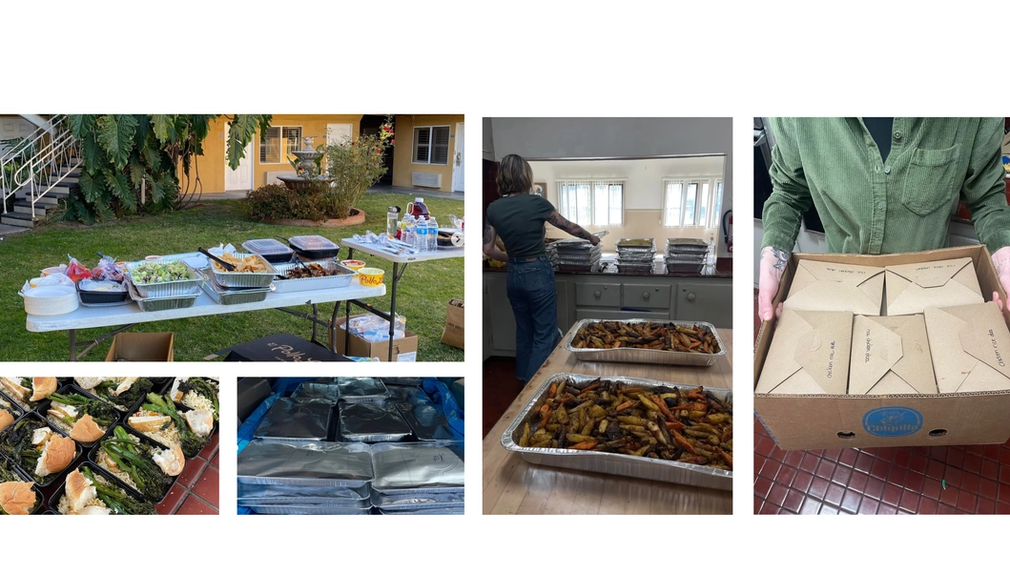Ending Hunger and Food Waste in Los Angeles
This grant will go to support the acquisition of kitchen space to meet the demand for fresh, hot meals for unhoused Angelenos on the Westside (specifically Mar Vista, Palms, Marina del Rey with the goal of expanding our service area). Meals will be cooked by volunteers, using recovered ingredients that were otherwise destined for a landfill.

What is the primary issue area that your application will impact?
Affordable housing and homelessness
In which areas of Los Angeles will you be directly working?
West LA South Bay
In what stage of innovation is this project, program, or initiative?
Expand existing project, program, or initiative (expanding and continuing ongoing, successful work)
What is your understanding of the issue that you are seeking to address?
The Free Food Collective was founded in 2021 by members of Palms Unhoused Mutual Aid (PUMA) to address the consistent hunger amongst unhoused folks PUMA was regularly engaging with via outreach efforts. Unhoused folks are rarely given food by their case workers, even those living in shelters, despite the amount of funding housing agencies and housing programs receive. Even when people do receive food, people report that it is often spoiled, makes them feel ill, ignores their dietary needs, is not enough to keep them full, or just doesn't taste good. By leveraging food donations from local businesses that would otherwise go to waste, we are able to provide fresh, delicious food to our unhoused neighbors while keeping perfectly good food out of landfills.
Describe the project, program, or initiative this grant will support to address the issue.
Los Angeles has a disproportionately small number of soup kitchens relative to its large unhoused population, while food banks—which primarily distribute raw ingredients—are more common. Our prepared meal service fills this critical gap, particularly for individuals living in shelters without access to cookware, as well as disabled and elderly community members who face barriers to food preparation.
We provide seven days of meal distribution across multiple locations and partnerships:
Sunday Operations: 75 people through our primary distribution site, plus 35 people served through our partnership with South Bay Mutual Aid Care Club (110 total)
Monday through Thursday: 75 people served daily through expanded programming
Friday: 100 people served through our largest weekly distribution (100 total)
This represents approximately 28,860 meals annually at current capacity, expanding to 36,660 meals annually with the proposed kitchen improvements—a critical intervention in a city where Los Angeles County's unhoused population faces severe gaps in access to hot, nutritious meals.
The funds from this grant would go towards renting a shared commercial kitchen space so we can feed more people every week and collect larger donations from current and future food donation partners.
Describe how Los Angeles County will be different if your work is successful.
If our work is successful, unhoused and food insecure Angelenos will be able to get hot meals that they want to eat, regardless of their housing status.
Our expanded operations will create meaningful volunteer opportunities for an estimated 200 community members annually, fostering civic engagement and breaking down barriers between housed and unhoused neighbors. These volunteer experiences build empathy, community connection, and shared investment in addressing housing and food insecurity.
Our prepared food recovery program addresses California's environmental mandates under SB 1383, which targets diverting organic waste from landfills to reduce methane emissions. By recovering prepared foods that would otherwise decompose in landfills, we contribute to California's goal of recovering 20% of food statewide. Prepared food recovery is particularly crucial as few organizations focus on this area compared to whole grocery recovery, yet it serves populations who lack cooking facilities.
Approximately how many people will be impacted by this project, program, or initiative?
Direct Impact: 500
Indirect Impact: 500